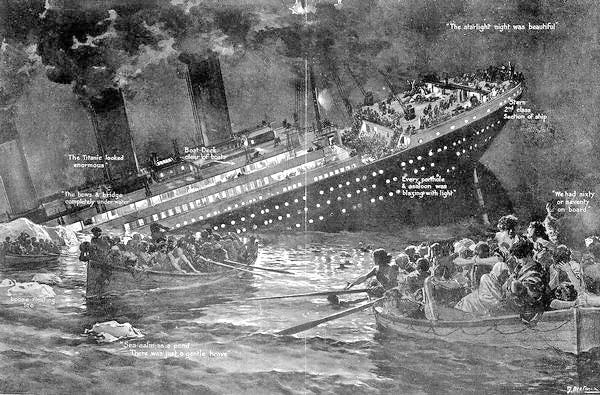
Once again, the Titanic has captured the public imagination.
This time, it is the story of five adventurers who took a submersible down to the wreckage and have, for the moment, disappeared. A global rescue effort is in process, and the media are filled with this singular story.
Here in the UK, every newscast leads with updates, and newspapers are filled with every angle of the story one can imagine.
Certainly it is a riveting story, but there are lots of shipwrecks that have taken place all over the world — why is it that the Titanic so captures our imagination, both in film and fact, and continues to draw people to see it?
The sinking of the Titanic was the world’s first media event.
Today, when a plane crashes or a terrorist attack or a war starts, it is a given that we can flip on CNN or The BBC or simply go online and find instant and live coverage of whatever is happening. But for most of human history, when a major event happened somewhere in the world, it could take days for the news of that event to reach the public.
When Napoleon was defeated at Waterloo, it took three days for the news of that outcome of that battle to reach London.
The Titanic changed all of that forever.
Along with their passengers and their crew and their insufficient number of lifeboats, the Titanic also carried something else — something that was, at that time, mostly experimental. The Titanic carried a Marconi radio.
The Marconi radio was not operated by the ship’s crew — no one would have known how it worked. Instead, it was operated by three employees of the Marconi company.
The Titanic, being the most luxurious ocean liner ever built — a swimming pool, a gymnasium, a spectacular central stair worth of a stately home, also offered their very wealthy first class passengers something no other ship could offer — the chance to send telegraphic messages home and receive them. This was, in a word, amazing.
When the Titanic hit the iceberg in the early hours of the 15th of April, 1912, the Marconi Company employees began to send out a distress call on the radio transmitter. Of course, very few people had radio receivers. The Marconi company was a relatively small company and had, in fact, few clients.
David Sarnoff, a Russian immigrant to New York had gotten a job with the Marconi Company at the age of 16. As the junior employee, he was given the task of sitting in the window of Woolworth’s Department Store in downtown Manhattan with a giant radio system.
It was a promotional gimmick, designed to show the public what this new-fangled radio thing was all about. Think Internet 1988.
Sitting in this very public place taking in radio messages (this was long before voice was broadcast), Sarnoff received the frantic messages from the radio room of the Titanic. Titanic Is Sinking.
This was, of course, big news. The Titanic was well known as the world’s largest and safest ship in an age when transatlantic liners were the only way to cross the seas. She was state of the art technology in every way.
Sarnoff was the first person to learn that the Titanic was sinking, but he soon told the nation. In the White House, President William Howard Taft ordered that all radios in the nation, except Sarnoff’s, be shut down.
For the next 36 hours, David Sarnoff continued to receive messages from the disaster. Meanwhile, a massive crowd gathered, not at the New York Times building where they had traditionally gone, but rather in front of Woolworth’s Department Store.
After the Titanic slipped under the waves, the Carpathia, another ship of the White Star Line, also equipped with a Marconi radio, began to transmit the names of the survivors as they were plucked from the freezing Atlantic. Sarnoff dutifully passed these on as well.
The sinking of the Titanic was the very first time a major news event was transmitted and experienced in real time. The sinking of the Titanic went LIVE to the nation and the world, as the disaster was unfolding. Nothning liek that had ever happened before. No one had ever experienced that before. It is for that reason that the Titanic sinking still resonates with us more than 100 years after the fact. It was our first live, as it happens, news event.
The Titanic went on to become iconic in our culture, but an even bigger event was unfolding at the same time.
Taking in the radio telephone traffic for hours on end, young David Sarnoff had an insight that would change the world.
Up until the Titanic, radio had been thought of a kind of wireless telephone for point to point communication — like the telegraph. But Sarnoff saw it differently. He saw that this new radio could be used to send one message, one signal to millions of people at the same time.
He envisioned a simple invention — a small box that would only receive, but not transmit, radio signals. It would have only two nobs — frequency and volume. And he called his invention a radio music box.
Sarnoff would go on to build and market his radio music boxes, and along the way found both RCA and NBC and in doing so, create much of the world that we live in today.


